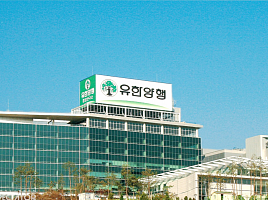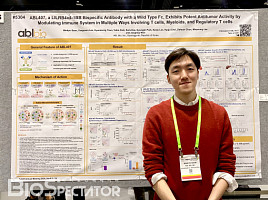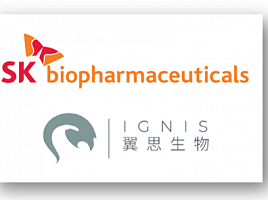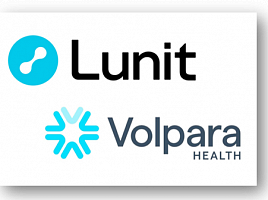기사본문
NK Max “… will apply for Clinical Phase 1/2 approval of NK Cell Therapy on solid tumor next month”
입력 2018-06-09 09:10 수정 2018-06-09 09:10
by Sungmin Kim

“NKMAX means maximizing the efficacy of Natural killer cell (NK cell). We plan to apply to MFDS for Phase I/II clinical trial approval next month as an autologous NK cell therapy using the patient’s own cells. We aim to prove clinical safety and efficacy, and to get drug approval in 2022. We have already started production in Japan from March, and have been administering it to patients. Clinical trial in Mexico is being set, too.”
Yongman Kim, GMP Center chief of NKMAX introduced the company’s development strategy. NKMAX was established in 2016 as a subsidiary of ATGEN, which sells the NK cell kits, and the NK cell activity calculation kits. NKMAX is an NK cell with enhanced efficacy, that primarily targets solid cancers, and the NKMAX subsidiary plans to expand its indications for autoimmune diseases. Currently, research on allogenic NK cell therapy and CAR-NK cells is underway.
NKMAX built the GMP Center for NK Cell production at Seoul National University Bundang Hospital this year, with the size producible for (10,000 to 20,000) finished products per year. One finished product represents one dose to the patient, and the company expects to actually administer it 10 times as a remedy. “We are confident that we have the best facilities for cell therapy companies”, Kim said. Kim also emphasized, “We are able to mass-produce NK cells that have excellent antitumor effects in cancer cells and solid tumors, and have a long life span, so we expect them to have good clinical efficacy.”
“The most important issue in NK cell commercialization is the proliferation technology, and while T cells have the property of being able to proliferate and proliferate, the NK cell is less able to proliferate. We can cultivate more than 1 billion cells per patient with our culture technology that grows at (1,000–10,000) times (20 days), and the purity reaches (95–99) %”, Kim said. NKMAX explained that based on the previously published papers. the company’s NK cell proliferation drainage and cancer cell killing ability are excellent.
As a basis for seeing Super NK cells work in solid tumors, “We have also observed the expression of CXCR3 and CD62L associated with immune cell migration; and we have confirmed the possibility of co-administration with existing antibody therapy”, Kim said. NKMAX has been used in combination with cetuximab, trastuzumab, rituximab, and kituruda to confirm the ADCC activity of NK cells. It has been proven in Xenograft tumor models that Super NK cells were effective on tumor growth in lung cancer, breast cancer, pancreatic cancer, and stomach cancer. On the other hand, the toxicity test confirmed safety when administered 24 times (3 times / week, 8 weeks).
NKMAX is planning to expand overseas as a self-NK cell therapy. Kim said, “We are preparing for clinical trials in the US and Mexico for patients with various solid tumors. In particular, we have scouted CMO and CMC specialists to speed up our entry into the US.” They have contracted with a US contract manufacturing organization (CMO) for production in the United States. Beside this, NKMAX plans to enter Japan, Europe, Canada, Taiwan, and Vietnam.
In regard to the future R & D of the new drug pipeline, Kim said “Currently, the limitations of homologous NK cells are that the patient’s immune rejection and duration of repeated administration are relatively low. Also technically, when the product is defrosted, it is necessary to solve the parts that are inactive, and NKMAX is also in the research stage.” The CAR-NK project says it is studying cancer in two different ways: by targeting cancer-specific antigens, and targeting targets of antigens that are commonly expressed in many cancer tissues.
Meanwhile, NKMAX has licensed a domestic patent on how to proliferate NK cells from peripheral blood. It is the company’s position that in the future, it will secure patents related to NK cell cancer activity, proliferation, and persistence.







